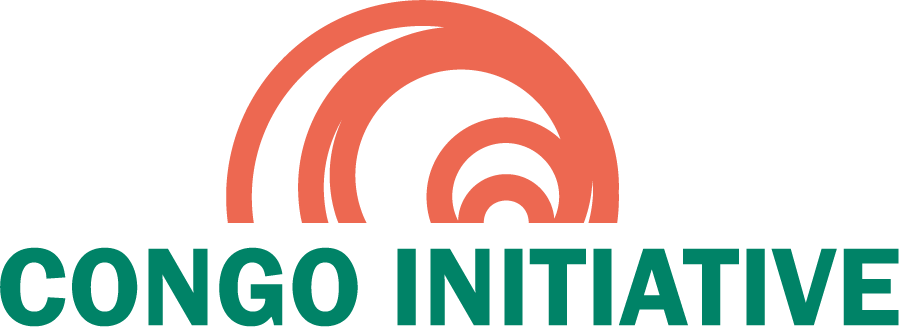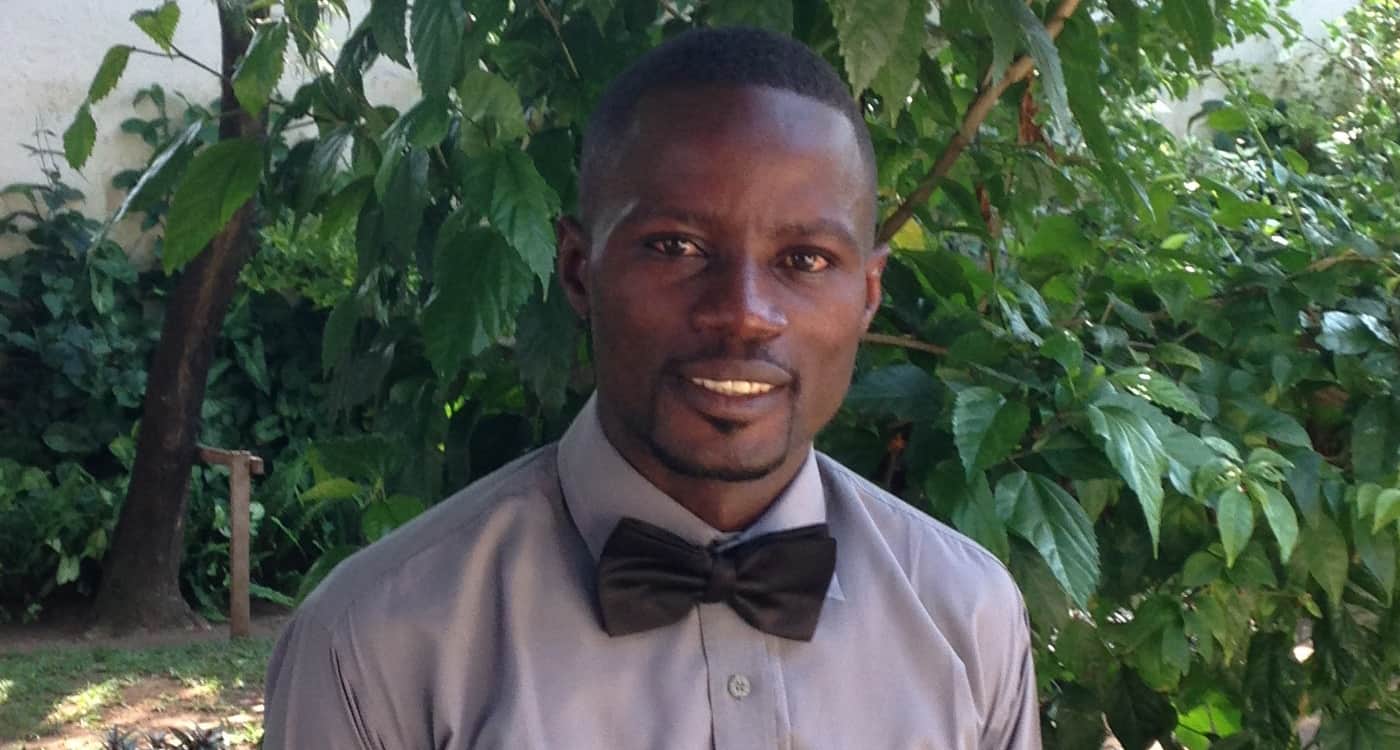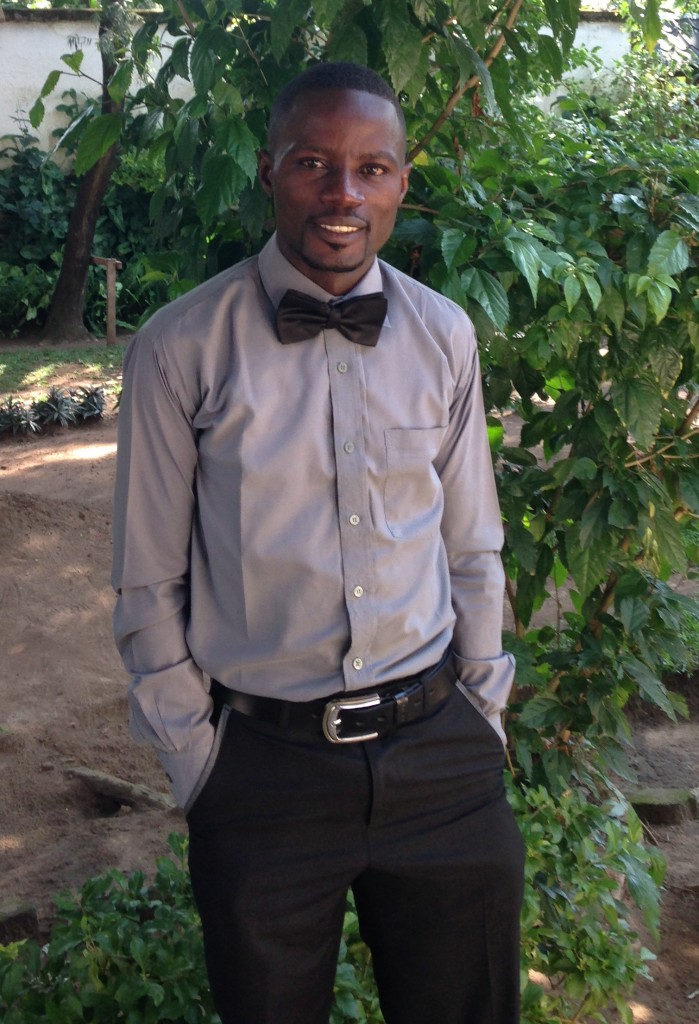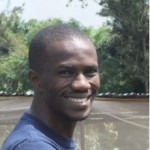[symple_toggle title=”Augustin Nobambuzi” state=”closed”]
Augustin Nobambuzi had a difficult childhood. Raised in a poor family and living with the constant fear of ethnic violence, Augustin was no stranger to school cancellations due to war, the constant concern of where money for education would come from, and how to keep the family safe.
He still bears the emotional and physical scars from his childhood, which he says impacted his heart as well. His mother once sold all her clothes so that Augustin could attend school, and his uncle paid his tuition at UCBC. It is this emphasis on family that drives Augustin to succeed as an alumni of UCBC.
Leaving his family in Bunia to study at UCBC wasn’t easy, but today, Augustin is the director of finance at Kivu Green, a new green energy company based in Beni started by CI’s Jon Shaw and other UCBC alumni. Augustin also serves as the director of finance at UCBC’s primary prep school, ABC (Academié Bilingue du Congo).
As an economics and financial management student at UCBC, Augustin was challenged to see education differently. He joined a study group, and was involved in mentoring students that were struggling to discourage academic dishonesty. This once shy and timid student has now become a leader in his community, helping students find their footing both financially and socially.
“God wanted me to study at UCBC to help people,” he says.
His long-term plans involve attending grad school and improving his English, but driving all that is a desire to see his country transformed.
He said that UCBC graduates are doing well in Beni, and the impact and value of their education is evident in the transformation of the community. “Transparency, accountability, a renewed work ethic, and service are all things I learned at UCBC,” he said. [/symple_toggle]
[symple_toggle title=”Colonel Marcel” state=”closed”]
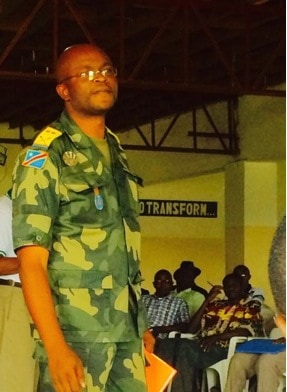 It was May 2015. A colonel of the Congolese army approached UCBC to request a meeting with David Kasali, Rector of the university. Dubious about the colonel’s intent and interest, David declined. The colonel persisted. David declined. Just a few short months earlier the city of Beni suffered as violence rolled through the region. Rebel militia groups terrorized innocent, local citizens, committing grotesque murders without reprisal or justice. Many thought the Congolese army was complicit. There seemed to be evidence that in some cases army troops colluded with rebels to devastate the population. Beni’s citizens lost faith in the military’s ability to protect the city.
It was May 2015. A colonel of the Congolese army approached UCBC to request a meeting with David Kasali, Rector of the university. Dubious about the colonel’s intent and interest, David declined. The colonel persisted. David declined. Just a few short months earlier the city of Beni suffered as violence rolled through the region. Rebel militia groups terrorized innocent, local citizens, committing grotesque murders without reprisal or justice. Many thought the Congolese army was complicit. There seemed to be evidence that in some cases army troops colluded with rebels to devastate the population. Beni’s citizens lost faith in the military’s ability to protect the city.
Attacks that occurred in October and November just 2-3 miles north of the UCBC campus, the physical home of Congo Initiative’s ministry, prompted UCBC administrators to direct students who were living near campus to find lodging 4-5 km away in town.
For these reasons as well as general caution about power that those in the military wield and demands they make out of that power, David remained reluctant to grant a meeting. But the colonel persisted.
After consulting his colleagues, David decided to relent and grant a meeting.
On the appointed day, David sat in his office surrounded by several UCBC leaders and administrators. Colonel Marcel arrived with his contingency. Formal greetings and introductions proceeded. Colonel Marcel began, “I’ve come to thank you for bringing the work of Congo Initiative and UCBC to our area. It is honoring our area and giving value to our community. It is a project that is accepted by all the local people. We see the fruit of your work. We witness the amazing difference we see in your graduates. They are creative leaders, compassionate toward others. They are greatly admired by all. I know now that there is no way we can allow this institution to be threatened or harmed, because it is essential to the life of our community.”
David and his staff were stunned. The colonel continued, “During the violence in November, I believed that I had a responsibility to protect this place; and so I took action. For many days my soldiers surrounded the campus. They hid in the bush and the ditches. We maintained a 24-hour watch.
“If this place is touched, the people of Beni will lose our good reputation. We cannot let that happen. We need to protect this place both because of what is being accomplished here, but also because of the symbol of hope that it is for the community.”
He concluded, “I am a man of power. I do my work by might. But Congo needs leaders who act with their minds and their hearts—leaders you are creating here at UCBC.”
[/symple_toggle]
[symple_toggle title=”Othy & Archip” state=”closed”]
It was mid-November, and UCBC staff members and graduates Othy Vitswamba and Archip Lobo embarked on the grueling 12-hour road trip from Beni, Congo to Kampala, Uganda. They were headed to Kampala for specialized training in mapping and GIS software to assist them and an 8-person team at UCBC in monitoring land disputes.
In Kasindi, Congo’s dusty, bustling border town, Othy and Archip stopped at the immigration office to register their departure from Congo into Uganda. “I need $20 to stamp this passport,” pronounced the office chief as she pointed to Archip’s passport. “This is a virgin passport. I need $20 to give it the first stamp.”
“Why?” Archip asked. “I paid the appropriate fees to obtain my passport legally. There is no law that I have to pay for the first time I use it, too.”
“This is how it is. We always require money to put in the first stamp,” the official demanded. Three other immigration officials in the room nodded in agreement.
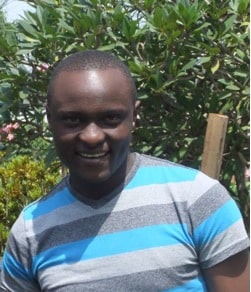
- Archip
“No. This is wrong. There is no such law,” Othy restated.
“This is how it always is. And you are from the university.” With a sneer, the chief pointed at the two young men. “You are traveling to Uganda. Clearly you have money. You can pay.” Seated across from her at a desk shared by two other officials, the two young men listened respectfully. All the while, inside them an ember burned.
She continued, “I have to do such things so I can get money and my children can go to school. You can pay $20. It’s nothing to you. How else can I pay to send my own children to school? You have an education. You have the money.”
Othy and Archip looked at each other. Committed to show respect for their elder and for a “mother of Congo,” they faced a recurring dilemma: bend to power and status quo, or live up to the ethics of a transformed way?
Othy spoke, “This is why our country is the way it is, because of corruption. People do not want to do their jobs correctly. You are stealing from our people, from our country.”
With her colleagues looking on, the chief refused to back down. “Ah! But this is how it is. This is how it was even before you were born. Do you think you can change that? Do you think you are the ones who can change this country?”
Emboldened by truth they replied, “Yes! We are the ones who will change this country! Our generation will change things.”
Archip pursued, “If we continue like this and you do not do your job properly, then your kids will never have money. They will never be able to go to school. But if we change and do things differently, then you will profit and your kids will profit.”
Archip had touched a nerve, and the chief registered a slight shift. She glanced at her colleagues and tipped her chin toward Archip, “OK, we will see if you can change this country.” With that she pounded the stamp on the passport and pushed it across the desk to Archip, motioning the two men out the door.
Not 40 yards away, Archip and Othy entered the medical office for the perfunctory scan at vaccination stamps. “Seventy dollars!” the medical examiner demanded.
“No,” the travelers replied. “That is not legal. We are going to Kampala for training to help our country. Congo needs to change. Congo is suffering because people in authority, people like you, take advantage and abuse your power. You should be helping this country. You should be helping us, instead of making it difficult.”
Two other men sat in the office listening to the exchange. The medical examiner challenged Othy and Archip, “You live in a fantasy if you think you can change this country!”
“No, this is a reality. We can change this country. We are the new leaders of this country. We have hope that things can be different. And we will be part of making that difference. Nothing will take this hope from us.”
The medical examiner pondered their challenge. Ten seconds passed. Twenty seconds passed. Close to a minute passed before he rose deliberately to his feet and reached out his hand. “We never meet people who speak like you. We encourage you.” The examiner then waved Archip and Othy on their way.
When Archip relayed this story to friends later, he commented, “I was shocked that all these people have lost hope. They are the ones who should show us the good way. They should be setting a good example for us. I was shocked, but we used the opportunity to show how we can change things in this country. Congo is the way it is because most people have lost hope. There were other workers in those offices, and they all heard us. Seven people heard our message of hope. We have already done part of the work. If each one of us from UCBC shares this message with just seven people, can you imagine what we will do?” [/symple_toggle]
[symple_toggle title=”Obed & Rebecca” state=”closed”]
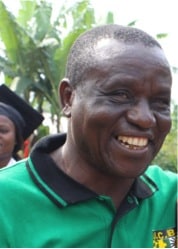
- Pastor Obed Mukanirwa
Obed Mukanirwa, a childhood friend of David Kasali, is a respected pastor and leader. It was Obed who traveled to Kenya to meet David Kasali in 2002 at the height of Congo’s civil war to challenge David “to look back at his country and to remember Congo.”
Obed explains, “David and I were both impressed with education in Nairobi and how people were excited about God. We asked, ‘Why not Congo?’” Obed returned to Congo, continued praying for his country, and continued challenging David and other pastors. Within months Obed and David reached out to pastors in eastern Congo and pleaded, “Come and cry with us, and let’s rebuild the church together here in Congo.”

- Rebecca is congratulated by Dr. Kaswera Kasali at graduation.
But Obed relates another more recent story—a story about personal transformation in the example of his assistant and recent UCBC graduate, Rebecca Kabagenyi. Responsible for Samaritan’s Purse work with refugees across northern Congo, Obed is held in high esteem by his colleagues for his faithful witness to Christ. Obed and Rebecca frequently travel to visit projects funded by Samaritan’s Purse. As is the common practice, they are issued a per diem for travel expenses such as food, taxi service, and lodging. This amount is usually $10/day. It is also generally-accepted practice that one keeps any unused per diem for one’s own personal use after the conclusion of the trip. Per diems become bonuses!
“On one occasion, we were issued $50 for a projected 5-day trip. We finished our trip early and returned home after just three days. I was inclined to keep the remaining $20. We had already signed for the money, and it was in our hands. This is a normal practice among organizations in our part of the world.
“Rebecca, my young assistant, spoke up to me and challenged me. ‘We must return the funds so they will be available for future travel.’
“I was surprised, stunned, even. Here in Congo, whatever you receive is considered yours to keep. That’s how most people live. And of course, a young person does not challenge her boss, her elder! But Rebecca did. She challenged me with her integrity. She humbled me. She taught me.
“That is the fruit of UCBC.”
[/symple_toggle]
